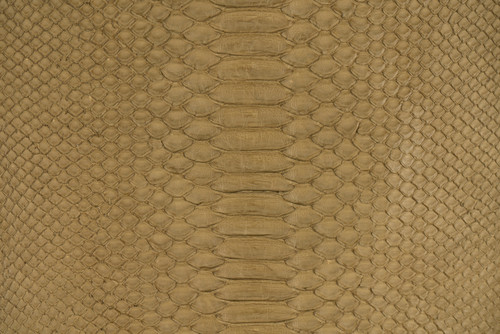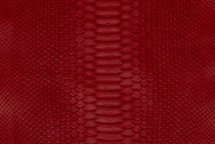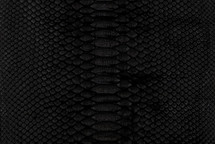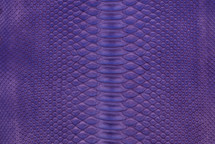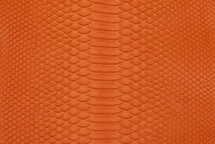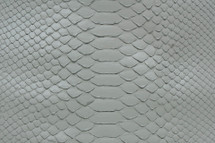- Home
- Skin Type
- Python Skin
- Python Skin Short-Tailed Matte Olive
Product Features
- 100% genuine short tail python
- Measures approximately:
- 1.3-1.7 m long
- 27-32 cm wide at widest point in the center
- 14-16 cm wide at the ends
- 0.8/1.0 mm thick
- Bleached
- Back Cut
- Grading:
- Grade 1: No defects in the center. Good for upholstery, garments and handbags.
- Grade 2: Some defects in the center. Good for shoes and small accessories.
Python Skin
Python skin is commonly used for handbags, footwear, garments,upholstery, belts, wallets and other small leather goods. The python skin species processed by PanAm Leathers are native to Southeast Asia. These species include the reticulated python or diamond python (python reticulatus) and the Borneo short-tailed python (python breitensteini). Pythons are mostly wild caught, while some small amount of ranching does exist. In both cases, the skins are a byproduct of the meat. Approximately 2 billion people worldwide eat reptile meat as a source of protein, mainly across East and Southeast Asia, Africa and the Southeast USA. Other parts of the animal other than the meat are also used in specialty dishes and pet treats. The demand for python skin exploded in Europe in the 1930’s and since a formalized international trade has since been developed. This material is known for its lush and supple feel, making it as easy to cut and sew, as it is to wear. The python skin scaling pattern is an unmistakable and all-time classic in high-luxury fashion and interiors.
Python Skin Characteristics
Specie
PanAm Leathers primarily deals in two species of python: the diamond python (python reticulatus) and the Borneo short-tailed python (python breitensteini). The main difference between these two species is the size. The diamond python average 3.25 meters in length and 31-32 cm in width, while the short-tailed python average 1.5 meters in length and 28-29 cm in width.
Cut
Python skin can be cut in two different ways: back cut or front cut. Back cut, a skin cut down the back, shows the wide belly scales running down the center of the skin. Front cut, a skin cut down the front, shows the smaller, more circular scales in the center with the wider scales at the outer edges. The diamond python skin is available in both cuts, while the short-tailed python skin is only available in back cut.
Bleached or Unbleached?
Python skin has natural geometric-shaped black markings. Bleached skins have these markings bleached out, so the whole skin is one solid color. Unbleached skins leave these markings intact and they will show through whichever color the skin is dyed. Unbleached back cut skins will show the natural markings on the outer edges and unbleached front cut skins will show the natural markings in the center. The natural markings on the diamond pythons are a diamond-shape, hence the name. The short-tailed pythons are not available unbleached. Bleached skins tend to be a little more expensive since the bleaching process is delicate, complicated and adds some costs.
Size
Python skin is measured in terms of both length and width at the center. Length is typically measured in meters and width is typically measured in centimeters at the widest point of the skin.
Yields
Below are the average yields in inches of each size category of each specie of python. For example, a short-tailed python in the 25/28 cm size range, stays nine inches wide for approximately eight inches long. These figures can help estimate the specie and size of skin that would be ideal for the panels on any given project or product.
|
Short-Tailed |
Reticulated |
|||||
|
25/28 cm |
29/32 cm |
|
27/30 cm |
31/34 cm |
||
|
W |
L |
L |
W |
L |
L |
|
|
11 |
0 |
9 |
10.5 |
0 |
18 |
|
|
10 |
0 |
14 |
10 |
0 |
28 |
|
|
9.5 |
0 |
18 |
9.5 |
0 |
36 |
|
|
9 |
8 |
26 |
9 |
16 |
52 |
|
|
8.5 |
14 |
32 |
8.5 |
28 |
64 |
|
|
8 |
20 |
36 |
8 |
40 |
72 |
|
|
7.5 |
33 |
42 |
7.5 |
66 |
84 |
|
|
7 |
40 |
45 |
7 |
80 |
90 |
|
|
6.5 |
45 |
49 |
6.5 |
90 |
98 |
|
|
6 |
53 |
52 |
6 |
106 |
104 |
|
|
5.5 |
full skin |
57 |
5.5 |
full skin |
114 |
|
|
5 |
full skin |
full skin |
5 |
full skin |
full skin |
|
Grading
Python skin is graded on the center ⅔ of the skin. So short-tailed python skins are graded on the center meter and diamond python skins are graded on the center two meters. There may be small holes on the very outer edges of all skins where the toggling clips are clipped during the tanning process, but this does not affect the cutting area, so it is not factored into the grading. Grades are defined as follows:
-
Grade 1: no defects in the center. Ideal for handbags, garments, interiors, large footwear panels, belts and other large accessories.
-
Grade 2: small and clustered defects in the center. Ideal for small footwear panels, electronics accessories, wallets and small leather goods.
-
Grade 3: many defects in the center or significant defects in the center. Ideal for small leather goods, jewelry or practicing crafting.
Defects typically include pinholes, scratches, scars and scaling deformations.
Thickness
Python skin averages 0.8/1.0 mm thickness. Extra large skins might run a bit thicker.
Temper
Python is typically soft and flexible with a medium-high drape, making it easy to cut, turn, fold, bend and sew. Of course, different finishes can affect the feel of the python in various ways. For example, skins with a glazed finish or a finish with heavy pigments will make the skin more rigid.
Common Uses for Python Skin
Grade 1 skins are ideal for handbags, garments, interiors, large footwear panels, belts, ipad cases and other large accessories.
Grade 2 skins are ideal for small footwear panels, electronics accessories, wallets, phone cases, knife sheaths, gun holsters, guitar straps, hat bands and small leather goods.
Grade 3: many defects in the center or significant defects in the center. Ideal for small leather goods, jewelry or practicing crafting.
Sustainability and Ethics for the Python Skin Trade
The python scores a 7 out of 10 in the PanAm Leathers Sustainability and Ethics Rating System. In biodiversity and meat use, it scores perfectly. On ethics, it scores a 1 out of 2, because the scientifically-backed ethical standards for how these animals are treated are still being developed and implemented, but steady progress is being made. On conservation, it scores a 2 out of 4 because it is CITES Appendix II, meaning the specie is not as in danger but must be trade-controlled to prevent exploitation.
Importing and Exporting Python Skin
Reticulated Python
-
Common name: reticulated python
-
Scientific name: python reticulatus
-
Country of origin: Indonesia
-
Source: Wild
-
CITES status: Appendix II, which requires CITES to import/export
Short-Tailed Python
-
Common name: Borneo short-tailed python
-
Scientific name: python breitensteini
-
Country of origin: Indonesia
-
Source: Wild
-
CITES status: Appendix II, which requires CITES to import/export
-
 Python Skin SizingSizing Python Skin
Python Skin SizingSizing Python Skin -
 Python Skin GradingGrading Python Skin
Python Skin GradingGrading Python Skin

